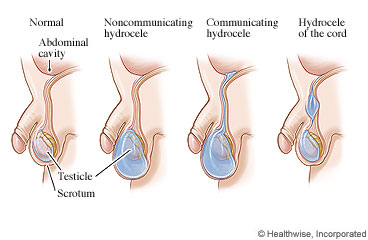Hydrocelectomy: Before Your Child's Surgery

What is hydrocelectomy surgery?
Hydrocelectomy is surgery to remove a hydrocele. A hydrocele is a sac filled with fluid in the scrotum.
A male can get a hydrocele on one or both sides of the scrotum. It happens when there's an opening between the belly and the scrotum. This opening lets fluid move from the belly to the scrotum.
Your child will be asleep during the surgery. The doctor makes a very small cut in your child's groin. This cut is called an incision. Then the doctor drains the fluid and removes the hydrocele sac. The doctor closes the incision with stitches. The stitches don't need to be removed. They will dissolve several weeks after surgery. The incision will leave a very small scar that will fade with time.
After surgery, there will no longer be an opening between your child's belly and his scrotum. This will stop fluid from building up in the scrotum.
Your child may be able to leave the hospital on the same day as the surgery. He will probably be able to go back to school or daycare in 4 to 7 days. But try to keep him from being too active and from lifting things for 2 weeks.
How do you prepare for surgery?
Surgery can be stressful for both your child and you. This information will help you understand what you can expect. And it will help you safely prepare for your child's surgery.
 Preparing for surgery
Preparing for surgery
- If your child is old enough, talk to your child about the surgery. Tell your child that the surgery will remove extra fluid from your child's scrotum. Hospitals know how to take care of children. The staff will do all they can to make it easier for your child.
- Ask if a special tour of the surgery area and hospital is available. This may make your child feel less nervous about what happens.
- Plan for your child's recovery time. Your child may need more of your time right after the surgery, both for care and for comfort.
- Understand exactly what surgery is planned, along with the risks, benefits, and other options.
- Tell the doctor ALL the medicines and natural health products your child takes. Some may increase the risk of problems during the surgery. Your doctor will tell you if your child should stop taking any of them before the surgery and how soon to do it.
The day before surgery
- A nurse may call you (or you may need to call the hospital). This is to confirm the time and date of your child's surgery and answer any questions.
- Remember to follow your doctor's instructions about your child taking or stopping medicines before surgery. This includes over-the-counter medicines.
What happens on the day of surgery?
- Follow the instructions exactly about when your child should stop eating and drinking. If you don't, the surgery may be cancelled. If the doctor told you to have your child take his medicines on the day of surgery, have your child take them with only a sip of water.
- Have your child take a bath or shower before you come in. Do not apply lotion or deodorant.
- Your child may brush his teeth. But tell your child not to swallow any toothpaste or water.
- Do not let your child wear contact lenses. Bring your child's glasses or contact lens case.
- Be sure your child has something that reminds him of home. A special stuffed animal, toy, or blanket may be comforting. For an older child, it might be a book or music.
At the hospital or surgery centre
- A parent or legal guardian must accompany your child.
- Your child will be kept comfortable and safe by an anesthesia provider. Your child will be asleep during the surgery.
- The surgery will take about 1 hour.
- After surgery, your child will be taken to the recovery room. As your child wakes up, the recovery room staff will monitor his condition. The doctor will talk to you about the surgery.
- You will probably be able to take your child home on the same day of the surgery.
When should you call your doctor?
- You have questions or concerns.
- You don't understand how to prepare your child for the surgery.
- Your child becomes ill before the surgery (such as fever, flu, or a cold).
- You need to reschedule or have changed your mind about your child having the surgery.
Where can you learn more?
Go to https://www.healthwise.net/patientEd
Enter G796 in the search box to learn more about "Hydrocelectomy: Before Your Child's Surgery".
Current as of: April 30, 2024
